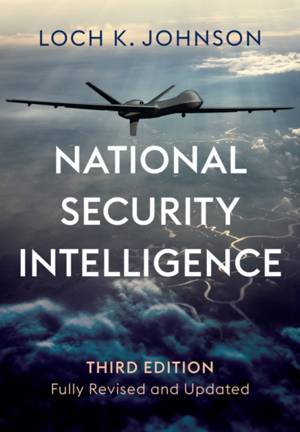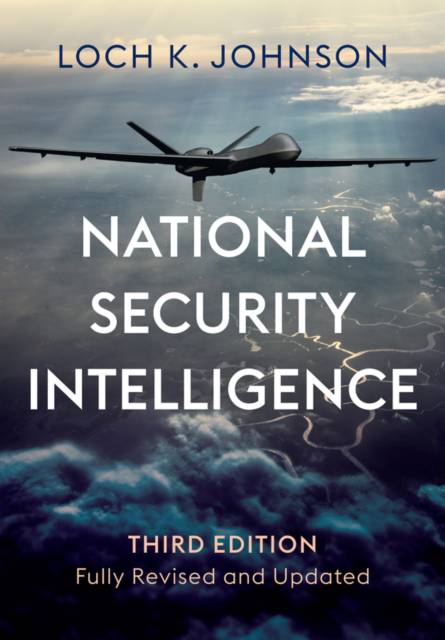
Bedankt voor het vertrouwen het afgelopen jaar! Om jou te bedanken bieden we GRATIS verzending (in België) aan op alles gedurende de hele maand januari.
- Afhalen na 1 uur in een winkel met voorraad
- In januari gratis thuislevering in België
- Ruim aanbod met 7 miljoen producten
Bedankt voor het vertrouwen het afgelopen jaar! Om jou te bedanken bieden we GRATIS verzending (in België) aan op alles gedurende de hele maand januari.
- Afhalen na 1 uur in een winkel met voorraad
- In januari gratis thuislevering in België
- Ruim aanbod met 7 miljoen producten
Zoeken
National Security Intelligence
Secret Operations in Defense of the Democracies
Loch K Johnson
Hardcover | Engels
€ 101,95
+ 203 punten
Uitvoering
Omschrijving
National security intelligence is a vast, complex and intriguing topic, made doubly hard for citizens to understand because of the thick veils of secrecy that surround it.
In the third edition of his authoritative introduction to the field, world-renowned intelligence expert Loch K. Johnson guides readers skilfully through this shadowy side of government. Drawing on over forty years of experience studying intelligence agencies and their activities, he explains the three primary missions of intelligence, before addressing the wider dilemmas of accountability posed by the existence of secret government organizations embedded in open, democratic societies.
Recent developments examined in this new edition include the dysfunctional relationship between the White House and America's secret agencies and fresh threats to democratic societies posed by authoritarian regimes. The new edition also offers, in two separate chapters, an expanded exploration of intelligence collection and analysis as well as new insights into covert action, from the use of propaganda and political operations to the overthrow of governments and assassination plots against foreign leaders. Throughout its pages, the book unpacks the ethical dilemmas of secret activities in the quest of global political and military objectives. It also gets to grips with the inevitable mistakes that are made in assessing world events; why some intelligence officers become traitors against their own countries by spying on behalf of foreign regimes; and how spy agencies can fall into scandalous behavior, including highly intrusive surveillance and harassment against the very citizens they are meant to protect.
Comprehensively revised and updated throughout, National Security Intelligence is a vital resource for anyone with an interest in how nations shield themselves against threats through intelligence organizations and operations, and how they strive for safeguards to prevent the misuse of this secret power.
In the third edition of his authoritative introduction to the field, world-renowned intelligence expert Loch K. Johnson guides readers skilfully through this shadowy side of government. Drawing on over forty years of experience studying intelligence agencies and their activities, he explains the three primary missions of intelligence, before addressing the wider dilemmas of accountability posed by the existence of secret government organizations embedded in open, democratic societies.
Recent developments examined in this new edition include the dysfunctional relationship between the White House and America's secret agencies and fresh threats to democratic societies posed by authoritarian regimes. The new edition also offers, in two separate chapters, an expanded exploration of intelligence collection and analysis as well as new insights into covert action, from the use of propaganda and political operations to the overthrow of governments and assassination plots against foreign leaders. Throughout its pages, the book unpacks the ethical dilemmas of secret activities in the quest of global political and military objectives. It also gets to grips with the inevitable mistakes that are made in assessing world events; why some intelligence officers become traitors against their own countries by spying on behalf of foreign regimes; and how spy agencies can fall into scandalous behavior, including highly intrusive surveillance and harassment against the very citizens they are meant to protect.
Comprehensively revised and updated throughout, National Security Intelligence is a vital resource for anyone with an interest in how nations shield themselves against threats through intelligence organizations and operations, and how they strive for safeguards to prevent the misuse of this secret power.
Specificaties
Betrokkenen
- Auteur(s):
- Uitgeverij:
Inhoud
- Aantal bladzijden:
- 320
- Taal:
- Engels
Eigenschappen
- Productcode (EAN):
- 9781509560332
- Verschijningsdatum:
- 16/09/2024
- Uitvoering:
- Hardcover
- Formaat:
- Genaaid
- Afmetingen:
- 171 mm x 246 mm
- Gewicht:
- 721 g

Alleen bij Standaard Boekhandel
+ 203 punten op je klantenkaart van Standaard Boekhandel
Beoordelingen
We publiceren alleen reviews die voldoen aan de voorwaarden voor reviews. Bekijk onze voorwaarden voor reviews.









